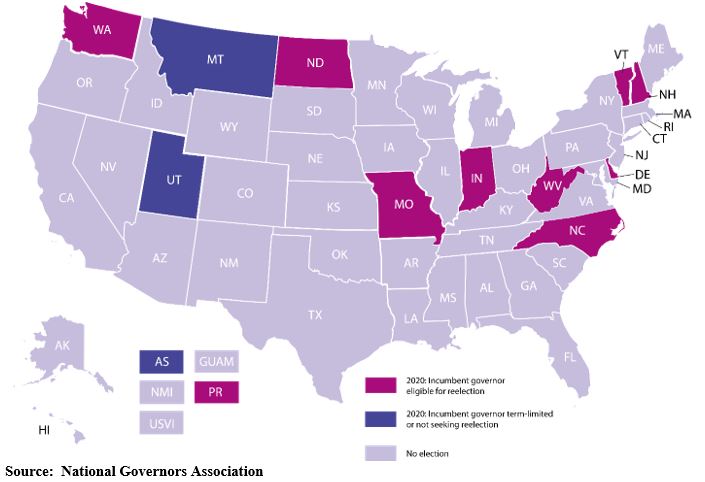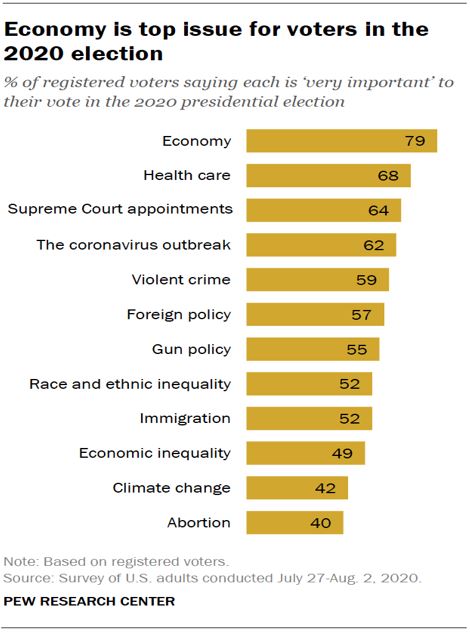The 2020 election is about more than who will live in 1600 Pennsylvania Avenue. 11 Governors and 50 state legislatures are in play that will have a larger impact on the implementation of economic development policy than any President. Economic development is truly a game played at the local and state government level. Land use, infrastructure finance and tax incentives all matched by workforce and tax policy all play a major role in how a region and state succeeds or fails in a COVID 19 economy.
According to the National Conference of State Legislators, there are 7,383 total state legislative seats throughout the states. While there are 99 total chambers in states because Nebraska is unicameral, we do not include Nebraska’s legislature in this chart because members are elected on a nonpartisan basis. Therefore, this represents partisan control in 98 chambers. When the same party holds both chambers, that party has legislative control. When the chambers are held by different parties, it is divided. Nebraska is not included. When the same party holds both legislative chambers and the governorship, that party has state control. When any of those three points of power is held by another party, state control is divided. This is based on the number of members of each party and does not consider coalitions that might change effective control. Nebraska is not included.

Voters in 44 states will choose more than 6,000 state legislators on Nov. 3, 2020. As of September 28, 2020, voters across the country will weigh in on at least 124 ballot measures on Election Day. Several critical tax measures have been placed before the voters in 2020.
- Alaska. Alaska voters face a proposal to increase taxes on oil and gas production in the state.
- Arizona. Arizonans will consider a citizen-initiated tax on incomes over $250,000 to increase teacher salaries and school funding.
- Arkansas. Arkansans will decide whether to continue a 0.5% sales tax that funds transportation.
- Colorado. The Colorado legislature referred a constitutional amendment that seeks to repeal the Gallagher Amendment, which set property rates in the state constitution that would freeze current residential and nonresidential property tax rates and allow the state to adjust property tax assessments under state law.
- California. A California citizen initiative aims to tax commercial and industrial properties based on their market—rather than purchase—value, with the additional revenue going to local governments, schools and community colleges.
- Illinois. Illinois voters will decide whether to repeal the state’s flat-rate personal income tax, enabling the legislature to enact a graduated income tax.
- New Jersey. Voters in New Jersey will decided if peacetime veterans are eligible to receive the veterans’ property tax deduction.
- Virginia. Virginia voters will weigh in on whether an issue will pass that exempts one motor vehicle owned by a totally disabled veteran from property taxes.
The nation’s governorships are nearly evenly split between the two parties, with 26 Republicans and 24 Democrats in office. 11 states will hold gubernatorial elections in 2020; seven of the incumbents are Republican, four are Democratic.

Incumbents are seeking re-election in Indiana, Missouri, North Carolina, West Virginia, New Hampshire, Delaware, North Dakota, Washington, and Vermont with open Governor’s races in Utah and Montana. Missouri’s Governor Mike Parson has a commanding lead in public opinion polling three weeks away from the election as does Indiana Governor Eric Holcomb, Governor Jay Inslee in Washington, Governor Jim Justice in West Virginia, and Governor Roy Cooper a Democratic incumbent running in a purple state leads his opponent in polling. The race in Montana remains a toss-up and is likely going to be the only close election among the 11 gubernatorial campaigns.
The performance of the economy remains the top issue among voters preparing for the 2020 election.

Polling from the Pew Research Center found that:
- With the country during a recession, 79% of voters surveyed say the economy is the top issue in the 2020 election.
- 68% of voters say health care is second most important to their vote.
- 64% cite Supreme Court appointments.
- As the country continues to grapple with the coronavirus outbreak, 62% of voters say the outbreak will be a very important factor in their decision about who to support in the fall.
- Following the protests and riots of the summer, 59% say violent crime will be very important to their 2020 decision, and 57% say this about foreign policy.
2020 is proving to be a challenging election for incumbents, challengers, and the voters as COVID 19 has slowed the economy and impacted everyday life for millions of Americans. This election will prove to be interesting and important for how the economic recovery is shaped in the years to come.